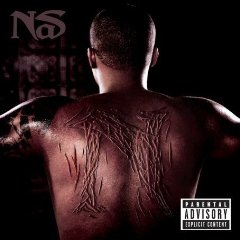There are two moments on the new Nas album which’ll make you stop dead. Pause, rewind to check, incredulous: "Did he really say that?" Two moments that make you believe he is truly fearless.
The first you may have seen coming. In retrospect, it’s predictable and right on an album whose original title was Nigger (it’s now untitled to ensure Wal Mart stockage) that Nas will should vent the darkest fumes of his mental combustions, the sick shit. We all hoped for the truth. But that doesn’t make it any less shocking the first time you hear him on ‘Testify’, rapping as from the analysts couch, shitting on his fans in “Safe suburbia”. A doctor invites him to vent: “You seem to be suffering from…post traumatic slave syndrome…” goes the pitch. The music starts – mid paced soul oozing with the spirit of Curtis Mayfield. And Nas vents.
It starts with a dedication to Jonathan and George Jackson, the black panther brothers, and for half a verse seems to be the story of George reloading his gun after killing three prison guards in 1971. The switch barely thirty seconds in is sudden and effective, drawing paralels, questioning his listeners: “You understand my struggle/That’s what you claim, right?” and suggesting, “So get your aim right/And get your game tight” but seemingly scathing on how likely that is, letting them know straight, “Don’t buy my songs, you don’t roll with it/Coming to concerts singing ‘ho’ and shit/Fuck y’all lil’ lil’ ho bitches/I don’t need y’all I’ll go gold with it” in a satisfied drawl.
It’s not the first time Nas has tried to alienate his audience, but it’s a change for him to be so upfront about it. Not that he’s straight with us from the start, but once you’ve reached ‘Testify’ it’s easier to see the tensions driving him through the first half.
Like the Chris Brown and The Game assisted plastic soul of ‘Make The World Go Round’, built on a synth sound so cheap and tinny you have to wonder if the studio monitors were bought from Argos. He boasts about his ability to floss: “I started bling, how could you question my direction.” Second time round, in the wake of ‘Testify’ you pay closer attention to the first verse and his indiscriminately scathing explanation: “I don’t feel great until my plush pieces cause you to suck your teeth”. You intuit he’s telling the truth and suddenly it’s no wonder he felt compelled to, if not invent, at least take an enthusiastic part in the first obnoxious glittery wave of bling.
Noting the allusions and citations of not only the Jackson brothers but Huey Newton, Emmet Till, Louis Farrakhan. Or the beguilingly oblique opener ‘Queens Get The Money’ where two minutes of agitated solo piano from Jay Electronica is a base for Nas to go random, asserting: “I’m over their heads, like a bulimic on the seashore”, and other such gems designed to prove that very boast. Even most of the more political songs through the first half of the album draw everything back to a confused Nas, trying to figure out where he fits in. The story of ‘America’ is the story of how Nas is from “The home of the thieves” while ‘Hero’ is some straight-up messianic posturing in the style of ‘Hate Me Now’.
The second half is more assured and direct but the shift in tone isn’t just about words. Musically the sounds become plush and welcoming like an instant devolution back twenty years to an analogue age, uniting the civil rights, black power and hip-hop generations in the same way he’s been attempting lyrically. It’s not that he’d been compromising, merely accommodating, sugaring the pill, changing the header but keeping the article intact. So the knowing self-mockery of ‘Fried Chicken’ where Nas and Busta Rhymes smirk salivating over unhealthy food until it kills them because “That’s just what niggers do” comes over a chirpy Mark Ronson pastiche of the classic soul.
Nas sounds liberated – having told his audience to fuck off he can say pretty much anything. And he does. So the second shocking moment comes on ‘We’re Not Alone’, one track before the end. The album’s arc is closing and talk of division has moved to constructive talk on how to heal those divisions. We’re just past ‘Y’all My Niggas’, a sober tracing of the semantic evolution of ‘Nigger’ to ‘Nigga’, and right before ‘Black President’, a Tupac sampling anthem heralding Barrack Obama the next president of the USA with a triumphant chorus of: "Yes we can/ Change the world…"
And for a moment ‘We’re Not Alone’ sounds in the same vein. The half-moaned crooning of guest Mykel suggests the song is on some environmental tip, then Nas spits a few lines on all America turning brown, citing Manhattan as an example. Then he pulls the real shocker, switching the focus up beyond the human race to extra-terrestrials: “I’m a tell you what I’ve seen with my three eyes/ Word to me/ Not a hoax, back in nine-nine/ A spacecraft in the skyline/ In LA in daytime/ Ask Horse if I’m lyin’.” You realise exactly how far out Nas has gone on this album. He’s not just exposing himself as an angry black radical, he’s willing to risk being seen as a total fruitcake.
He’s past inhibition to the land where all the greatest music is made. ‘Untitled’ is the type of focused and sustained firebomb which could only be delivered by an elder statesman, the type of album you’d hope Public Enemy, KRS-One or Ice Cube may yet still pull off in their later years. That it’s also an album being sold to teenagers in Wal-Mart is cause for celebration.


